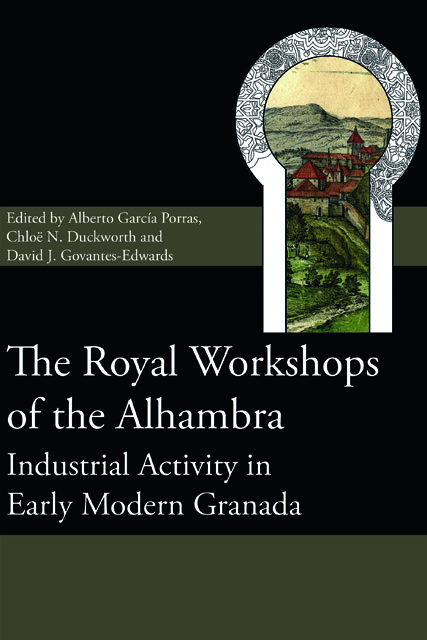Book contents
- Frontmatter
- Contents
- List of Illustrations
- List of Contributors
- Acknowledgements
- Foreword
- Introduction
- 1 The Secano: the city of the Alhambra
- 2 A holistic and reflexive methodology for the archaeological investigation of pyrotechnological activity in the Alhambra
- 3 The modern kilns
- 4 Geophysical and geochemical exploration of the industrial areas in the Alhambra
- 5 The excavation of the area of the Secano in the Alhambra: Trench 1
- 6 The excavation of the area of the Secano in the Alhambra: Trench 2
- 7 The pottery
- 8 Glass in the excavation of the Secano, the Alhambra
- 9 Furnaces at full blast: the demand for architectural ceramics for construction in the Alhambra (16th and 17th centuries)
- Conclusions
- Index
Foreword
Published online by Cambridge University Press: 20 December 2023
- Frontmatter
- Contents
- List of Illustrations
- List of Contributors
- Acknowledgements
- Foreword
- Introduction
- 1 The Secano: the city of the Alhambra
- 2 A holistic and reflexive methodology for the archaeological investigation of pyrotechnological activity in the Alhambra
- 3 The modern kilns
- 4 Geophysical and geochemical exploration of the industrial areas in the Alhambra
- 5 The excavation of the area of the Secano in the Alhambra: Trench 1
- 6 The excavation of the area of the Secano in the Alhambra: Trench 2
- 7 The pottery
- 8 Glass in the excavation of the Secano, the Alhambra
- 9 Furnaces at full blast: the demand for architectural ceramics for construction in the Alhambra (16th and 17th centuries)
- Conclusions
- Index
Summary
Since the monument of the Alhambra and its environment were awarded World Heritage status by UNESCO in 1984, the Patronato de la Alhambra y Generalife (PAG) has been the institution entrusted with their preservation. The management of the monument follows a set of regulations established in 1986, which have been upgraded and updated several times since. Its ‘Aims and Functions’ include ‘Designing conservation plans […] excavations and other research activities within the monument and ensuring that said projects meet the most up-to-date conservation standards and follow the criteria set out in the appropriate international guidelines’, and ‘Facilitating the work of researchers in the field of archaeology, epigraphy, etc. and cooperating with other cultural or research bodies’.
Although, in and of itself, the PAG is not an archaeological research body, since its creation it has tirelessly supported archaeological research, mostly from two well-defined perspectives: first, by tasking its staff with the necessary maintenance of archaeological features and contexts (what could well be defined as ‘preventive preservation’); second, by cooperating with teams of external experts to carry out complex and targeted research projects.
These agreements are of a widely varied nature, depending on the research bodies involved, the duration of the projects and administrative requirements. Currently, the public management of research involving historical heritage in Spain concerns all three major administrative tiers (national, regional, and local), with the participation of numerous public and private bodies, including international organizations. The multidisciplinary approaches that this affords, and the combination of ground-breaking techniques mobilized, is one of the keys of modern archaeological research.
In this context, in 2015, the PAG leapt at the opportunity to integrate the palatial city of the Alhambra in the The al-Andalus Glass Project, an ambitious programme of international research which aimed to examine glass production in medieval Iberia and the western Mediterranean from multiple angles. This soon led to a project to undertake the geophysical and geochemical survey of the area of the Secano, the ultimate aim of which was to begin characterizing the industrial sectors of the old madīna.
The work presented in this volume includes archaeological survey and excavation, mostly undertaken in the summers of 2016 and 2017 but also involving many hours in the archives, warehouses and laboratories. The archaeological techniques used include both ‘traditional’ and ground-breaking survey and excavation techniques.
- Type
- Chapter
- Information
- The Royal Workshops of the AlhambraIndustrial Activity in Early Modern Granada, pp. xv - xxPublisher: Boydell & BrewerPrint publication year: 2022



